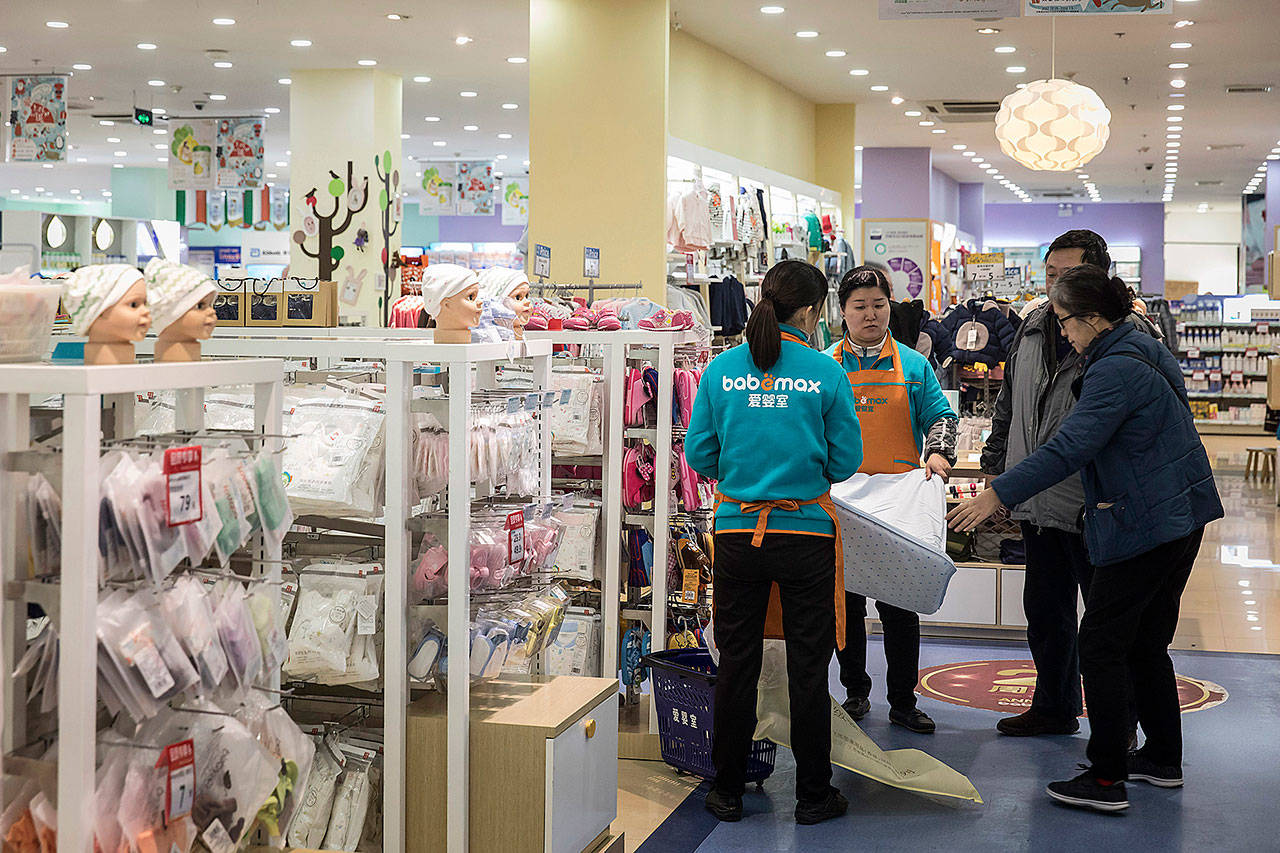By Heather Long / The Washington Post
The mighty force of consumerism has taken hold in China. In 2018, retail sales in China are expected to equal or surpass sales in the United States for the first time, another definitive marker in China’s rise to economic superpower status. The growth of China’s domestic retail market is luring everyone from automakers to make up companies that want to cash in on the country’s growing middle class, but it also serves as another complication in President Donald Trump’s quest to transform U.S.-China trade.
Retail sales in China are on track to hit just over $5.8 trillion this year, according to Mizuho, a Japanese bank. It’s a stunning rise from a decade ago, when retail sales in China were a quarter of those in the United States. China’s rapidly growing middle class has been eager to buy brand-name clothes, cars and cellphones, among other products. Shanghai is now referred to in fashion circles as “Paris of the East.” Their spending habits have been supported by fatter paychecks, with China’s income per capita jumping from about $2,000 a year a decade ago to over $8,000 a year now.
“China’s best bargaining chip is its massive and fast-growing domestic market,” says Jianguang Shen, chief China economist for Mizuho, who pointed out the retail trend in a recent presentation in Washington, D.C. “This will change the balance (of power) tremendously, as it is first time when the U.S. is dealing with a market of equal size in a potential trade war.”
On the campaign trail, Trump railed against China as the “economic enemy” of the American people. He harped on the fact that the United States buys far more than it sells to China. The United States ran a $310 billion trade deficit with China in 2016. But Trump has softened his tone on China lately, especially after he visited China in November, and the countries have jointly faced escalating nuclear tensions with North Korea.
Steve Bannon, Trump’s former chief strategist, was one of the harshest critics of China in the White House. “To me, the economic war with China is everything,” Bannon said over the summer. His excommunication from the Trump fold might also reduce the urgency in the White House to go after China.
Still, the two nations continue to dance around each other in a quest for global and economic dominance. Both sides continue to look for leverage over the other. On Wednesday morning, a Bloomberg story suggesting the Chinese government might halt its purchases of U.S. Treasurys was enough to temporarily spook U.S. markets, sending stocks sliding in early trading. China is the largest foreign holder of U.S. Treasurys. There are also more playful jabs between the countries. A mall in northern China put up a giant dog balloon that bears a striking resemblance to Trump.
If Trump really wants to go after China on trade, “we will need leverage and we will need allies,” says Olin Wethington, who served as a special envoy to China in 2005 and as an economic adviser to President George H.W. Bush. Wethington’s name has surfaced for a possible role in Trump’s State Department.
Wethington says he personally prefers bringing trade cases against China over the blanket tariffs Trump talked about on the campaign trail, which many warn would spark a trade war that could harm the U.S. economy and the stock market’s rapid climb.
While Trump wants to show his blue-collar base he is being tough on trade, big businesses don’t want to see any dramatic actions. Over 20 percent of sales at companies like General Motors, Boeing and Apple now come from China, says Shen, the Mizuho economist. Any restrictions on Chinese access to the United States would likely be met with barriers to American companies selling in China.
“China is one of the most important markets for many U.S. multinational companies,” Shen says. “This should lend China immense bargaining power.”
A record 17.6 million vehicles were sold in the United States in 2016, for example, but that was far below the 24 million passenger cars sold in China. U.S. automakers account for about 1 out of every 5 cars sold in China, even though the communist government placed a 10 percent tax on luxury cars and trucks imported from the United States.
But MIT economist David Autor, an authority on trade and automation, thinks the United States still has substantial leverage in any debate with President Xi Jinping of China.
“China exports a substantial piece of its GDP to the United States. They are very dependent on our markets,” Autor says. The United States currently buys 19 percent of China’s total exports.
One area where there’s a lot of agreement across the political spectrum is to go after China’s theft of U.S. intellectual property. It’s an increasingly important area as the race for global dominance in robotics, biotech and new energy takes off. Trump has been mulling whether to take action, although he’s largely been focused on Chinese steel and aluminum. Trump has pointed to the tariffs President Ronald Reagan put on Japanese semiconductors in the 1980s as a model he wants to emulate, but the difference is the U.S. economy was far larger than Japan’s at the time. Now the United States faces an economic equal.
As Trump deliberates what to do, Autor says the president has already handed China a great victory on trade.
“Trump did China the biggest favor of the last 10 years by tearing up TPP (the Trans-Pacific Partnership),” Autor says, calling it the best gift to China since the communist country joined the World Trade Organization in 2001. “If you want to look for an inflection point in rate of U.S. global decline, we’ll probably be able to point to tearing up TPP.”
Talk to us
> Give us your news tips.
> Send us a letter to the editor.
> More Herald contact information.

























